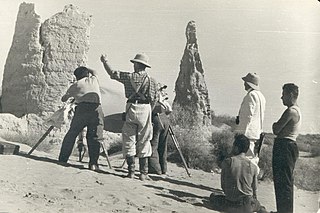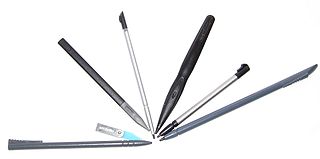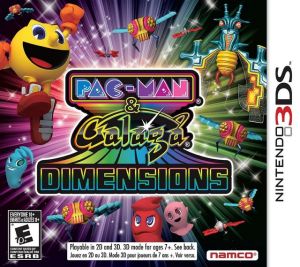Related Research Articles

Letter-boxing is the practice of transferring film shot in a widescreen aspect ratio to standard-width video formats while preserving the film's original aspect ratio. The resulting video-graphic image has mattes of empty space above and below it; these mattes are part of each frame of the video signal.

A view camera is a large-format camera in which the lens forms an inverted image on a ground-glass screen directly at the film plane. The image is viewed, composed, and focused, then the glass screen is replaced with the film to expose exactly the same image seen on the screen.

In computer displays, filmmaking, television production, and other kinetic displays, scrolling is sliding text, images or video across a monitor or display, vertically or horizontally. "Scrolling," as such, does not change the layout of the text or pictures but moves the user's view across what is apparently a larger image that is not wholly seen. A common television and movie special effect is to scroll credits, while leaving the background stationary. Scrolling may take place completely without user intervention or, on an interactive device, be triggered by touchscreen or a keypress and continue without further intervention until a further user action, or be entirely controlled by input devices.

In filmmaking and photography, the Dutch angle, also known as Dutch tilt, canted angle, or oblique angle, is a type of camera shot that involves setting the camera at an angle so that the shot is composed with vertical lines at an angle to the side of the frame, or so that the horizon line of the shot is not parallel with the bottom of the frame. This produces a viewpoint akin to tilting one's head to the side. In cinematography, the Dutch angle is one of many cinematic techniques often used to portray psychological uneasiness or tension in the subject being filmed. The Dutch angle is strongly associated with German expressionist cinema, which employed it extensively.

Tilt Train is the name for two similar high-speed tilting train services, one electric and the other diesel, operated by Queensland Rail. They run on the North Coast line from Brisbane to Rockhampton (electric) and Cairns (diesel). Services commenced in 1998.

APIA Leichhardt Football Club, also known simply as APIA, is a semi-professional soccer club based in the suburb of Leichhardt in Sydney, Australia. The club was formed in 1954 as APIA Leichhardt, by Italian Australians. APIA, winner of the national Australian championship of 1987, is currently a member of the NPL NSW. APIA Leichhardt are one of just three winners of the 1960s Australia Cup that are still active, the other being Caroline Springs George Cross FC and Hakoah Sydney City East FC.

Screen Gems is an American brand name owned by Sony Pictures Entertainment, a subsidiary of Japanese multinational conglomerate, Sony Group Corporation. It has served several different purposes for its parent companies over the decades since its incorporation, initially as a cartoon studio, then a television studio, and later on as a film studio. The label currently serves as a film production that specializes in genre films, mainly horror.
Harold Edward "Hal" Porter was an Australian novelist, playwright, poet and short story writer.

In cinematography and photography, panning means swivelling a still or video camera horizontally from a fixed position. This motion is similar to the motion of a person when they turn their head on their neck from left to right. In the resulting image, the view seems to "pass by" the spectator as new material appears on one side of the screen and exits from the other, although perspective lines reveal that the entire image is seen from a fixed point of view.

The Australian Height Datum was introduced in 1971 as the official vertical datum for Australia, and thereby serves as the benchmark to which all height measurements are referred. The Australian Height Datum is an amalgamation of decades of spirit levelling work conducted by numerous state and territory authorities across the country, and was corrected to align with the mean sea level observations of thirty tide gauges positioned around the entire coastline. While it remains the published vertical datum for all surveying and engineering operations performed throughout Australia, newer technologies have uncovered numerous deficiencies, offsets and distortions within the Australian Height Datum, leading to discussions about defining a new Australian vertical datum.

Pecanland Mall is an enclosed shopping mall in Monroe, Louisiana, United States. The mall was named Pecanland because the land on which the mall is located was formerly a pecan farm. The mall is on Interstate 20 near U.S. Highway 165, the two major highways in the area.
Bill Bain was an Australian television and film director.

An articulating screen is a built-in small electronic visual display which is not fixed, but rather can be repositioned using a hinge or pivot. The articulating screen is known under different other names such as flip-out screen, flip screen, adjustable screen, articulated screen, or hinged screen. According to the way it moves, there are five main types:
- The display moves around one axis, so that it only tilts. It is called tilting screen or tiltable screen.
- The display tilts horizontally both up and down and also vertically. This type is called double-hinged tilting screen, two-axis tilting screen, three-direction tilting screen or screen with 3-way tilt.
- The display moves around two axes which are at a right angle to each other, so that the screen both tilts and swivels. This type is called swivel screen. Other names for this type are vari-angle screen, fully articulated screen, fully articulating screen, rotating screen, multi-angle screen, variable angle screen, flip-out-and-twist screen, twist-and-tilt screen and swing-and-tilt screen.
- The display is mounted on a fully-articulating hinge that itself is attached to a tilting plate. Such display can be extended out from the back of the camera, ensuring it stays clear of the camera's left-mounted ports when flipping it out to the side. This type of articulating screen is called tilt-and-articulating screen.
- The display moves into a variety of angles; it tilts horizontally and vertically and also rotates to a certain extent while staying aligned with the lens axis. It still can not be turned all the way up, down or to the side to be seen from the front of the camera for self-portraits. This type of articulating screen is called cross-tilt screen, flexible-tilt screen or flex-tilt screen.

In computing, a stylus is a small pen-shaped instrument whose tip position on a computer monitor can be detected. It is used to draw, or make selections by tapping. While devices with touchscreens such as newer computers, mobile devices, game consoles, and graphics tablets can usually be operated with a fingertip, a stylus provides more accurate and controllable input. The stylus has the same function as a mouse or touchpad as a pointing device; its use is commonly called pen computing.

Pac-Man & Galaga Dimensions is a 2011 video game compilation developed and published for the Nintendo 3DS by Namco Bandai Games. It contains six games from the company's Pac-Man and Galaxian franchises—Pac-Man (1980), Galaga (1981), Pac-Man Championship Edition (2007), Galaga Legions (2008), Pac-Man Tilt, and Galaga 3D Impact, the last two being unique games created exclusively for this collection. The collection also includes achievements, online leaderboards, and a trailer for the Pac-Man and the Ghostly Adventures television series.

Janel Manns is an Australian wheelchair tennis player. She has been selected to represent Australia at the 2012 Summer Paralympics in tennis.
Blumhouse Productions, LLC, doing business as Blumhouse, is an American independent film and television production company founded in 2000 by Jason Blum and Amy Israel.

The Diesel Tilt Train is the name for three high-speed tilting trains, operated by Queensland Rail on the North Coast line from Brisbane to Cairns as part of its Spirit of Queensland service.

The Electric Tilt Train is the name for two identical high-speed tilting trains operated by Queensland Rail for the Tilt Train service on the North Coast line from Brisbane to Rockhampton which entered service in November 1998.
Noel Robinson is an Australian writer of many television and radio plays in the 1960s. Split Level (1964) was her first original screenplay. Filmink called her "a writer who should be better known." She moved to London where she worked for over a decade.
References
- ↑ "Beer and mateship". The Age. 7 November 1966. p. 6.